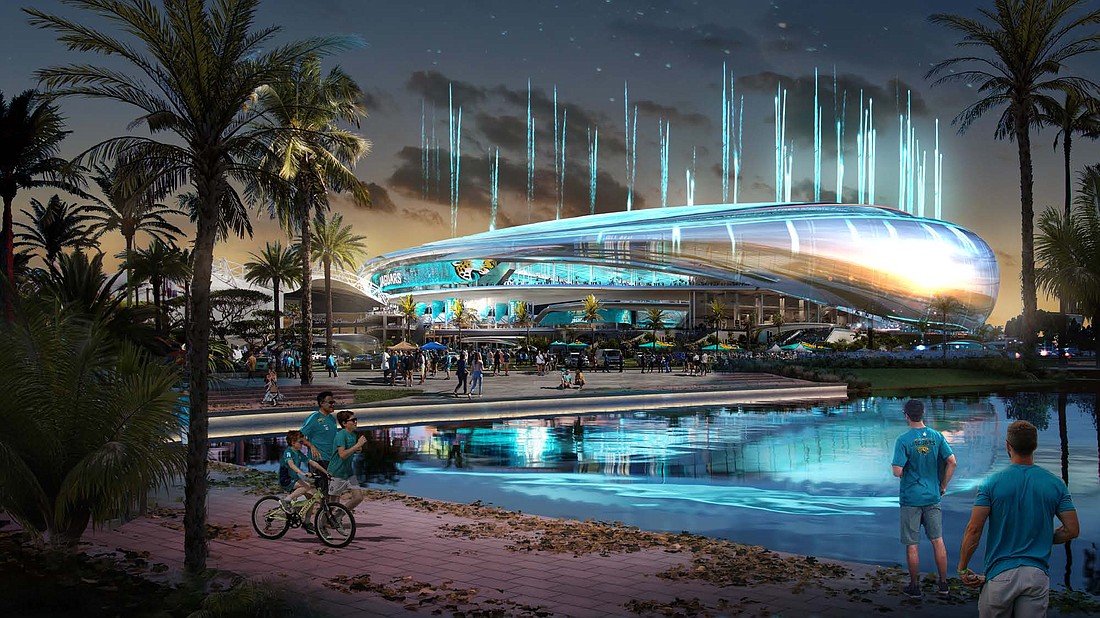
A divided Jacksonville City Council approved a plan to split up the proposed “Stadium of the Future” deal between the city and Jacksonville Jaguars by carving out $94 million in its community benefits agreement for consideration beginning in July.
On a show of hands, Council approved 11-2 an amendment to the stadium legislation, Ordinance 2024-0904, that uncouples the city funding for the community benefits from the package of nine separate agreements that make up the overall stadium deal.
Council members Rahman Johnson and Jimmy Peluso voted no. Council members Kevin Carrico, Terrance Freeman, Reggie Gaffney Jr. and Ju’Coby Pittman abstained because of conflicts of interest. Members Boylan and Diamond were absent.
As originally proposed, the $300 million community benefits agreement — split between the Jaguars and the city — included money for parks, countywide services and the Eastside neighborhood near the stadium. The Jaguars would make $5 million annual contributions over the agreement’s 30-year term.
After passing the amendment, Council voted 13-0 to advance the revised ordinance to a June 25 vote. Carrico, Freeman, Gaffney Jr. and Pittman again abstained.
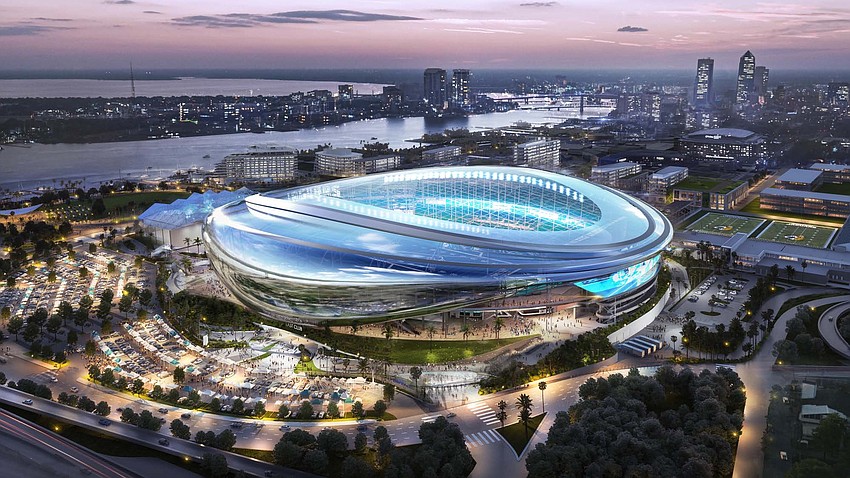
With $94 million in community benefits removed, total funding for the stadium is $1.45 billion.
Under the deal, the Jaguars and city will each provide $625 million for construction costs of revamping EverBank Stadium. The city would contribute an additional $150 million in deferred maintenance and capital improvements to prepare the stadium for the project and make it usable by the team after work begins.
The amended ordinance retains $56 million in city spending that was part of the community benefits agreement for funding for development of three riverfront parks and the Daily’s Place flex field adjacent to the stadium.
The city’s remaining benefits funding, which will be introduced as separate legislation in July, includes $30 million for the Eastside and $50 million for countywide workforce development, affordable housing and homelessness services.
The renovated stadium would include a roof cover that would protect seating areas from direct sunlight and rain; openings at the corners to allow for cross ventilation and reduce temperatures; a park-like entrance; an elevated concourse; and expanded options for food and beverages, among other amenities.
Opposition to the split
Council members Johnson and Peluso opposed the amendment, raising concerns that Council may reduce or reject the additional community benefits.
“If we allow ourselves to get too scared and spooked, we could pull these dollars back,” said Peluso, who offered an unsuccessful amendment to keep the $30 million in Eastside funding in the ordinance.

Both Peluso and Johnson referenced a large turnout of Eastside residents supporting the community benefits during a June 17 public hearing on the stadium deal. The residents said the funding was badly needed in a neighborhood struggling with low income levels and property values through generations of neglectful and inequitable treatment by city decision-makers and through harmful policies such as redlining.

“I believe that if we begin to sever this agreement that it will be watered down, and I believe I have a responsibility to keep this agreement undiluted,” Johnson said.
The Jaguars initially offered $100 million in community benefits as part of the stadium deal, which alone would have been a record-high amount of funding in the NFL. The city offered $150 million in return for a commitment by the Jaguars to provide an additional $50 million, increasing the total package to $300 million.
Road to the amendment
The community benefits package, unlike the other elements of the deal, prompted concerns among several Council members over how the funding would be spent and how it would affect the city budget amid pending expenditures on a new jail, fund police and fire pensions, city incentives for economic development projects and more.
The benefits agreement and stadium deal also yielded conflicts for Carrico, Freeman, Gaffney and Pittman.
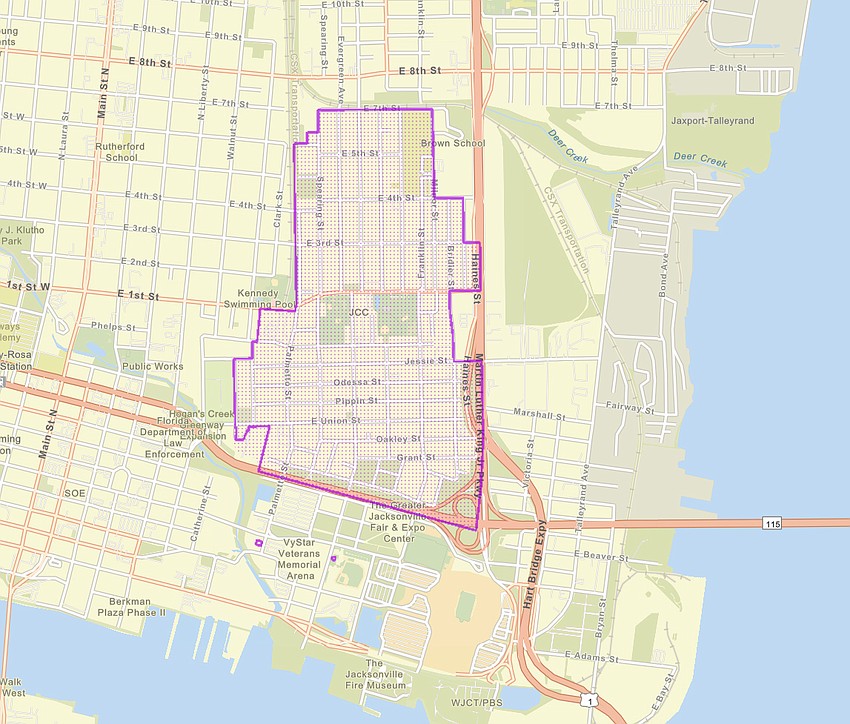
Carrico is an administrator for the Northeast Florida Boys and Girls Club, which offers development support for young people with programming that includes workforce preparation. Pittman is CEO of the Clara White Mission, which provides homelessness services. Gaffney also cited a work conflict related to his position at the Community Rehabilitation Center. Freeman said his employer, Miller Electric, may compete for bids on the project.
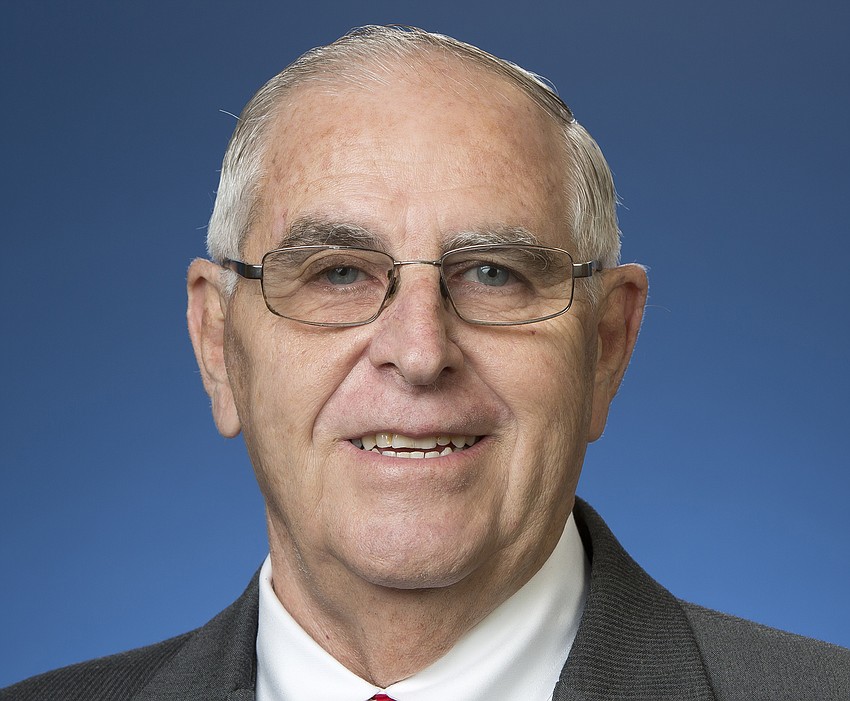
Council member Randy White, who will become Council president in July, worked with Mayor Donna Deegan’s office to craft the amendment. He said it was designed to allow the largest number of Council members to vote on the bulk of the stadium package.
Mike Weinstein, the lead negotiator for Deegan’s office, said the administration wanted a vote on the full package but saw the amendment as a “way to move forward.”
JAX Chamber CEO Daniel Davis told Council members that the chamber supported the amendment but would continue to support the full community benefits funding. He said the full stadium deal was central to the chamber’s efforts to attract businesses and “the best talent” to Northeast Florida.
“We’re committed to the Community Benefits Agreement, we’re committed to the Eastside and we’re committed to economic development for all,” he said.
Fiscal concerns
Council member Nick Howland said that unlike the money for parks, which was broken down into detailed amounts for each of the four projects, the remaining funding for benefits was in “buckets” as opposed itemized expenditures. He said it would be fiscally responsible for Council to separate that funding out and seek details on it.
“We shouldn’t just approve buckets,” he said.
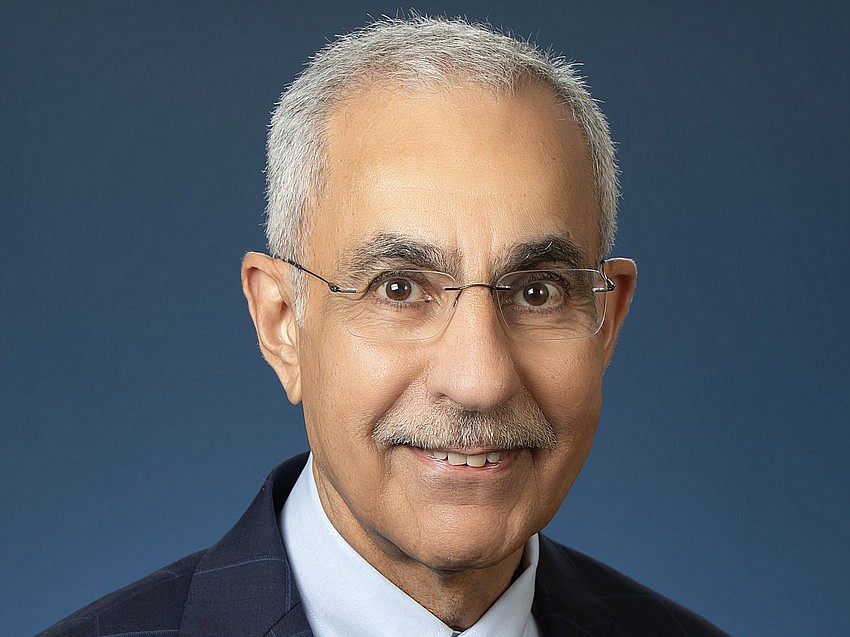
Council president Ron Salem said the carved-out funding needed to be weighed against the city’s pending funding commitments and revenue projections for the 2025-26 and 2026-27 fiscal years, when the spending would occur.
“These are major dollars,” he said. “We don’t know where it’s going to come from. We don’t know if we have those dollars.”
Salem said he’d asked the administration for details on how the benefits funding would fit in with other outlays, such as the jail and incentives, but hadn’t received answers.
“We do not have a money tree in this city,” he said. “We’ve got to make sure the dollars are there.”
A Council timetable calls for legislation on the benefits funding to be introduced July 23.
The process
In addition to considering the amendment, Council examined the stadium deal’s parking agreement, development agreement and 30-year lease during the June 20 meeting.
On June 21, Council is scheduled to consider several other proposed amendments, including adding a requirement for 10% of work to be done by registered and certified apprentices, shifting management of the facility from the Jaguars to a third party and allowing the city to retain 100% of sales tax savings realized through tax-exempt direct purchases of supplies and materials versus splitting that revenue with the team.
The meeting is 9 a.m. to 4 p.m. June 21 at City Hall, 117 W. Duval St.
The June 25 Council meeting is scheduled to begin at 3 p.m., two hours before normal starting time. Salem said the stadium ordinance will be the last item for consideration that evening.